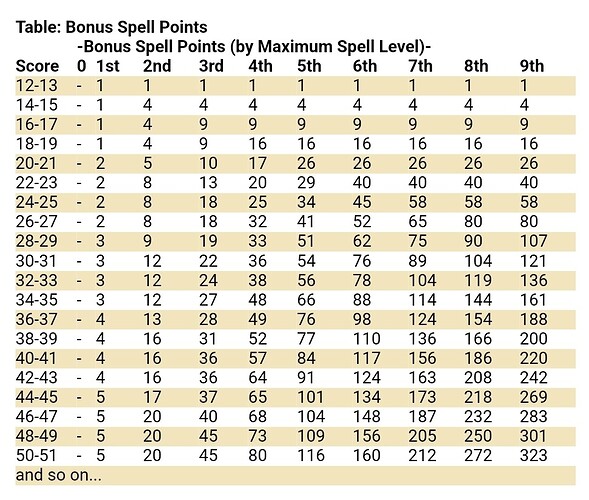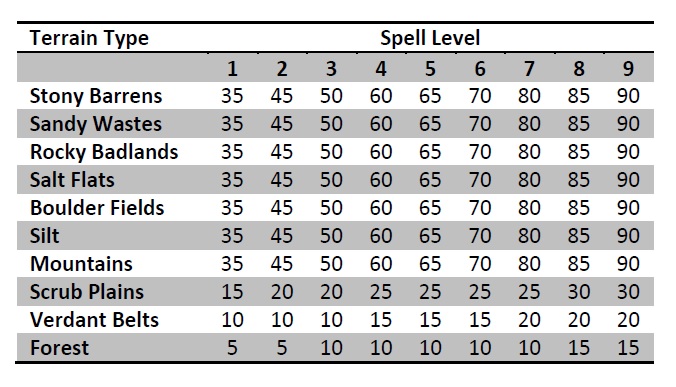I aim to provide a detailed explanation of a spell point system designed specifically for defilers, while leaving preservers with the traditional spell slot system. This approach is intended to accurately depict the thematic differences between these two types of arcane casters, offering an engaging and immersive experience.
Defilers and Preservers: Fundamental Differences:
To comprehend the reasoning behind this proposal, let’s first revisit the core distinctions between defilers and preservers in the Dark Sun setting. Defilers harness life energy from their surroundings to fuel their spells, often causing devastation in the process. In contrast, preservers practice a more sustainable form of magic, tapping into natural energy sources without inflicting harm upon the environment.
Implementing the Spell Point System for Defilers:
The proposed spell point system offers defilers a more flexible way of preparing spells, allocating spell points instead of being confined to traditional spell slots. Here is a breakdown of how the system would work for defilers:
- Defilers would have a reserve of spell points based on their class and level, as well as bonus spell points from a high ability score.
- Defilers would still need to prepare their spells ahead of time but would allocate their spell points to the spells they wish to prepare.
- Spell points are expended upon successful preparation. Once a spell is prepared, it can be cast once without consuming any additional spell points.
- Defilers can prepare multiple copies of the same spell, as long as they have enough spell points. Each copy of the spell consumes the appropriate number of spell points during preparation.
This increased flexibility in spell preparation mirrors the defilers’ ability to drain life energy as needed, depending on the situation at hand. By utilizing the spell point system, defilers gain a more authentic portrayal of their volatile and destructive magic.
Maintaining the Traditional Spell Slot System for Preservers:
By preserving the traditional spell slot system for preservers, we emphasize the distinction between their controlled, conservative approach to magic and the defilers’ more reckless methods. This separation reflects the preservers’ commitment to preserving the balance of nature and highlights the contrasting moral implications of their magic.
Addendum: Defiler Sorcerers and the Spell Point System
For defiler sorcerers in the Dark Sun setting, I propose an adaptation of the spell point system that accounts for their spontaneous spellcasting nature. Defiler sorcerers would follow the same rules as regular sorcerers, with a few adjustments to incorporate the spell point system. Here is a breakdown of how the system would work for defiler sorcerers:
1 Defiler sorcerers would have a reserve of spell points based on their class and level, as well as bonus spell points from a high ability score.
2. Unlike prepared spellcasters, defiler sorcerers do not need to prepare spells ahead of time. They retain their spontaneous casting ability, which allows them to choose which spells to cast at the moment of casting.
3. Defiler sorcerers would expend spell points upon casting a spell, rather than upon preparation. The number of spell points consumed would correspond to the level of the spell being cast.
4. As spontaneous casters, defiler sorcerers can cast any spell they know, provided they have enough spell points to cover the cost. They are not locked into spell slots, offering increased flexibility in their spellcasting choices.
By adapting the spell point system for defiler sorcerers, we can maintain their spontaneous casting abilities while still reflecting their unique defiling magic. This approach creates a cohesive and thematic experience for defiler sorcerers in the Dark Sun setting, aligning their mechanics with the core principles of defiling magic without sacrificing their inherent spontaneity.
How the system works: The system is a modification of the system in Unearthed Arcana.
SPELL POINTS
The spell point system presented here allows prepared spellcasters to have more flexibility in preparing their spells each day, without giving them the full spontaneity of spontaneous casters like sorcerers.
Every spellcaster has a reserve of spell points based on their class and level (see Table: Spell Points Per Day). Characters also gain bonus spell points from a high ability score (just as normal spellcasters would gain bonus spells from a high ability score; see Bonus Spell Points and Bonus Spells, below).
Cantrips or 0-level spells consume 1/2 spell point per preparation.
Prepared spellcasters (such as wizards) must still prepare their spells ahead of time, but they allocate their spell points to the spells they wish to prepare instead of using the traditional spell slot system.
Spell points are expended upon successful preparation. Once a spell is prepared, it can be cast once without consuming any additional spell points.
Prepared casters can prepare multiple copies of the same spell as long as they have enough spell points. Each copy of the spell consumes the appropriate number of spell points during preparation.
Metamagic enhancements must be chosen when preparing spells, not when casting them. This means that wizards and other prepared casters must decide which spells to enhance with metamagic when they prepare their spells for the day.
Spontaneous casters, like sorcerers, still have an edge in flexibility, as they can decide which spells to cast on the fly without having to prepare them ahead of time.
For example, a 4th-level generalist wizard with a 16 Intelligence score would have 15 spell points. This wizard could use his 15 spell points to prepare glitterdust (3 points), invisibility (3 points), scorching ray (3 points), featherfall (1 point), color spray (1 point), sleep (1 point), grease (1 point), detect magic (1/2 point), mending (1/2 point), mage hand (1/2 point), and light (1/2 point). Alternately, he could prepare five 2nd-level spells (each costing 3 points) but no other spells. If he wanted, he could prepare three copies of scorching ray (3 points each) and have 6 points left to prepare other spells.
In this system, prepared casters can use their spell points to prepare multiple copies of the same spell, giving them more flexibility in choosing their daily spells.
A character who would normally receive bonus spells from a class feature (such as from wizard specialization) can instead prepare extra spells of the appropriate levels and schools. The character doesn’t get any extra spell points (and thus can’t cast any more spell than normal), but the added flexibility of being able to use the bonus spell more than once per day makes up for that.
For instance, a specialist wizard can prepare one extra spell from the chosen school of each spell level that she can cast.
For example, if a 4th-level wizard were an evoker, she could prepare one additional spell per level, but that spell would have to be from the evocation school. Once it is prepared, she can use that spell just like any of her other spells, casting it once.
Table: Spell Points Per Day
| Level | Wizard | Sorcerer |
|---|---|---|
| 1st | 2 | 3 |
| 2nd | 4 | 5 |
| 3rd | 7 | 8 |
| 4th | 11 | 14 |
| 5th | 16 | 19 |
| 6th | 24 | 29 |
| 7th | 33 | 37 |
| 8th | 44 | 51 |
| 9th | 56 | 63 |
| 10th | 72 | 81 |
| 11th | 88 | 97 |
| 12th | 104 | 115 |
| 13th | 120 | 131 |
| 14th | 136 | 149 |
| 15th | 152 | 165 |
| 16th | 168 | 183 |
| 17th | 184 | 199 |
| 18th | 200 | 217 |
| 19th | 216 | 233 |
| 20th | 232 | 249 |
Spell Point Costs
| Spell Level | Spell Point Cost |
|---|---|
| 0 | 0.5 |
| 1st | 1 |
| 2nd | 3 |
| 3rd | 5 |
| 4th | 7 |
| 5th | 9 |
| 6th | 11 |
| 7th | 13 |
| 8th | 15 |
| 9th | 17 |
Disregard the extra costs for damaging spells detailed Unearthed Arcana. It is not used in the spell point defiler system.
The Decision to Defile: A Dilemma for Preservers
In the Dark Sun setting, the distinction between defilers and preservers is critical to the campaign’s themes and moral dilemmas. In light of this, I propose a revised variant rule called “The Defiling Choice,” inspired by The Amber Enchantress. This rule allows preservers to make a desperate decision to defile in exchange for regaining the use of a previously cast spell, emphasizing the consequences of choosing to defile.
The Defiling Choice - A Revised Variant Rule for Preservers:
- In dire circumstances, a preserver may choose to expend their prepared spell slots to gain spell points in order to regain the use of a spell they have already cast that day and no longer have prepared.
- The preserver must sacrifice a number of prepared spell slots with a combined spell point cost equal to the desired spell’s spell point cost.
- Upon choosing to defile, the preserver immediately gains a number of spell points equal to the combined spell point cost of the sacrificed spell slots. These spell points can only be used to regain the use of the specific spell the preserver wishes to cast.
- The act of defiling has severe consequences, causing environmental destruction and potentially impacting the preserver’s alignment or reputation. The preserver may also face consequences from other characters or factions who are aware of their decision to defile.
- As this choice represents a significant moral dilemma for the preserver, the player and the Dungeon Master should carefully roleplay the decision-making process and its aftermath.
The Defiling Choice variant rule provides an opportunity for preservers to face difficult moral decisions and highlights the consequences of choosing to defile. By incorporating this rule into your Dark Sun campaign, you can emphasize the thematic distinction between defilers and preservers and enrich the roleplaying experience for players navigating the harsh world of Athas.

